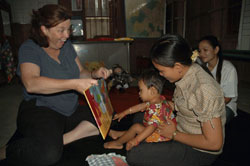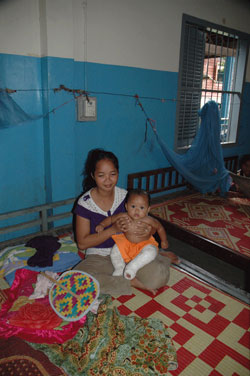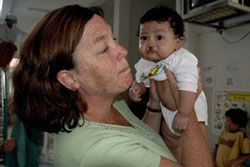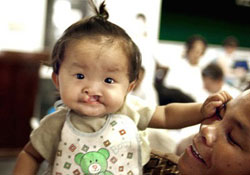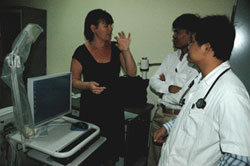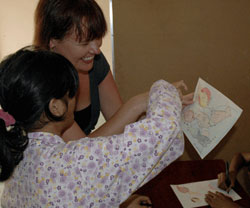This past summer, two faculty members from TC’s Department of Biobehavioral Sciences—Karen Froud, Assistant Professor in the Speech-Language Pathology and Neuroscience and Education programs; and Cate Crowley, Distinguished Lecturer and Coordinator of the Bilingual Extension Institute—visited several health and non-profit organizations in Cambodia. Their ultimate goal: to develop the first generation of Khmer-speaking speech-language pathologists.
Froud has a long-standing association with Cambodia through her friendship with Karl Balch, currently the British Consul Warden in Siem Reap Province. Crowley established and conducts a four-week annual program in Bolivia, where graduate students participate in speech pathology work, study and humanitarian activities.
Cambodia today is a country struggling back to its feet after many years of social and educational deprivation following the genocide years under the Khmer Rouge in the 1970s.
After visiting Angkor Wat (3) and Ta Prohm (1), the overgrown ruins which were made famous by the Tomb Raider movies, Crowley and Froud went to Siem Reap City (6), where Handicap International provides prostheses and rehabilitation for people who have lost limbs in land mine incidents, as well as mobility aids and physiotherapy for physically handicapped individuals. Families learn in workshops how to alleviate physical and cognitive difficulties. Froud and Crowley met a 2-year-old boy with cerebral palsy (4) who sat hunched over, with his gaze permanently fixed on the floor due to poor muscle tone. By showing the mother how to hold his head, change his posture, and use some stimulating materials, they were very quickly able to engage his attention so that he was reaching out to turn the pages by himself.
Art and dance are among the academic and vocational offerings at the Cambodian Center for the Protection of Children’s Rights (CCPCR), a residential and vocational center for girls and young women who have been removed from abusive or dangerous situations at home that is run by Family Care Cambodia (8). At Phnom Penh Pediatric Hospital, Crowley was able to teach the mother and aunt of a baby on the verge of cleft lip repair bilabial “noises” that would help Farid (7) to start making “front” sounds, a difficulty for children born with craniofacial abnormalities.
Operation Smile (2) hopes to participate in any training TC might set up, and to put into practice interventions beyond surgery as part of their services.
While Froud and Crowley are still in the early stages, several positive developments occurred as an immediate result of their trip. One was the discovery by Froud that doctors at Phnom Penh Pediatric Hospital did not know how to use a 36-channel electroencephalogram (EEG) machine donated from Korea. She has promised to provide them with instruction upon her return (5).
Another is that in late October, through the efforts of the Cambodia Project (a humanitarian non-government organization founded by Columbia University alumnus Jean-Michel Tijorino) TC hosted a reading by Sichan Siv, a former U.S. Ambassador to the United Nations, from his book Golden Bones—the story of Siv’s escape from the Khmer Rouge in Cambodia and his subsequent inspiring adventures in the United States
Crowley and Froud believe they can provide helpful interventions in speech and language pathology very quickly and without needing detailed language-based communication. They are committed to the idea that any program they set up in
Cambodia must provide information and training for people who live and work in the local communities. A full account of their journey can be found at
www.tc.edu/bbs/cambodia.
Published Tuesday, Jan. 6, 2009
